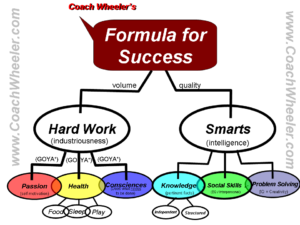
Do you ever wonder what makes the likes of Elon Musk, Oprah Winfrey, or Mahatma Gandhi not just succeed but excel in their respective fields? The answer lies in two profound concepts: Vision+Mission. They might sound like corporate jargon, but believe me, these two concepts hold immense power in shaping our lives and driving us towards amazing results. In this article, we will delve into how a strong understanding of these concepts, Vision+Mission, when applied diligently, can lead to phenomenal results in any area of your life.
What is a Vision? What is a Mission? Why are they important in our lives? And most importantly, how can we apply these concepts effectively? Let’s find out!!
The Power of Vision
Vision is the art of seeing what is invisible to others,” according to the acclaimed writer Jonathan Swift. Quite insightful, isn’t it? But what does it mean to us?
At the heart of every significant achievement lies a powerful vision. A vision is your ‘why’. It is a vivid mental picture of what you aspire to achieve – your own personalized version of the ‘promised land’. Let’s take a moment and think about this: What is your ‘why’? What is that bigger picture that fuels your dreams and actions?
In simple terms, our Vision is our long-term goal. It’s our dream, our aspiration. It’s the mental picture of what we want our future to look like. Vision is the big picture that serves as your guiding light, the beacon in the storm. It keeps you centered, focused, and motivated.
You;ve heard of Elon Musk, right? He is the visionary leader of companies SpaceX and Tesla. Musk’s vision is to make human life multiplanetary and create sustainable energy solutions on Earth. This might sound far-fetched, but it’s his guiding light, leading his actions, and attracting people who share his vision to join his cause. It’s also what keeps him motivated to work long hours, sometimes sleeping in his factories to make sure things go as planned. Elon’s dream might sound like science fiction to some, but it’s this audacious vision that propels Musk and his teams to push the boundaries of what is technically possible. As Musk once said, “When something is important enough, you do it even if the odds are not in your favor.” As Coach Wheeler often says (paraphrasing a famous philosopher), “If you have a big enough “Why”, you will always come up with the “How.””
Let me ask you …. What’s your vision? What do you aspire to achieve in the long run? Take a moment to reflect on it, and feel free to jot it down. Dream as big as you want. Write down something that would be incredibly cool to achieve. If it will be easy, will it motivate you to make sure it happens?
Your Vision should feed your purpose, the reason why you get up every morning.
The Power of Mission
Once we have a clear Vision, we need a way to get there. That’s where Mission comes in.. Mission is your ‘how’ -. It’s your plan, your path to achieving your vision.
As business strategist Peter Drucker put it, “The mission of an organization is what it does day in and day out to fulfill its vision.” Your mission defines the goals and targets on the way to achieving your destination… your vision.
Look at Google’s mission, for example – “to organize the world’s information and make it universally accessible and useful.” This mission guides their daily operations and decision-making, keeping them aligned with their overarching vision of a world where information is easily accessible to everyone.
Oprah Winfrey’s mission was to use television to uplift, enlighten, and entertain, while adhering to her values of integrity and personal growth. It was her mission that led her from humble beginnings to become a global media leader and philanthropist. Oprah often spoke about her sense of mission, saying, “The biggest adventure you can ever take is to live the life of your dreams.” So, how about you? Have you defined your mission?
What’s your mission? What actions and decisions are you taking daily to move towards your vision? What processes have you put in place to ensure you are making progress toward your envisioned future? Write down the top 3 things you need to do every day to make progress towards your dream. Make sure there is action involved. Planning is important but make sure that only one of the 3 things you write down and commit to doing is planning related.
Joel Barker, a renowned futurist, rightly said, “Vision without action is merely a dream. Action without vision just passes the time. Vision with action can change the world.” So, how clear is your vision? And more importantly, are you taking action to make it a reality?
Vision+Mission in Unison
Having a Vision without a Mission is like having a destination without a map, and having a Mission without a Vision is like having a map with no destination. It’s when these two come together that magic happens.
The connection between vision and mission is vital. You see, vision gives your life direction, while the mission gives you the concrete steps to reach that direction. In essence, vision is your ‘why’, and mission is your ‘how’.
Think of Mahatma Gandhi, a lawyer turned freedom fighter whose vision was an independent India. His mission was to achieve it through non-violence and civil disobedience. His clarity of vision and mission inspired millions to join his cause, and despite numerous challenges, India eventually gained its freedom from the British Empire.
Similarly, Dr. Martin Luther King Jr. had a vision of racial equality and freedom for all. His mission? Nonviolent civil disobedience. This mission was the how behind his vision. His powerful speeches, peaceful protests, and relentless advocacy were all driven by his mission. His vision and mission together sparked a civil rights revolution and changed the course of history. His “I have a Dream” speech remains one of the most powerful orations of all time, and his impact is still felt today.
Mastering vision and mission requires reflection, determination, and patience. Vision needs imagination and courage to dream big. As Albert Einstein said, “Imagination is everything. It is the preview of life’s coming attractions.” So, allow yourself to dream, to envision a future without constraints.
So, the question is – how clear is your vision, and how well-defined is your mission? Are they aligned? Do they fuel your passion and drive you towards your goals?
Cultivating Your Vision+Mission
Forming a clear Vision and Mission isn’t a one-day task. It’s a journey of self-discovery and requires deep thought. Here are a few steps you can take:
Identify Your Passions: What do you love doing? What are you passionate about? Passion is a strong driver for both vision and mission. If your vision doesn’t feed your passion, it’s unlikely that you will stick to the mission. Passion needs to be identified and applied to your mission to achieve your mission.
Identify Your Values: What are your core values? These are the guiding principles that shape your vision and mission. What is important to you? If your vision and mission will require you to make sacrifices, they need to be in line with your values so you can feel good about everything you put into the mission to achieve your vision.
Dream Big: Don’t limit your vision. Aspirations should be big enough to push your boundaries. Don’t be dragged down by other people, maybe family or friends, who don’t share your vision of what could be possible. Their definition of “reality” or “what’s possible” shouldn’t hold you back. Remember, it’s your dream, not someone else’s.
Make a Plan: This is your mission. How will you achieve your vision? What steps do you need to take daily? Don’t worry if there are some gaps down the road. The mission can evolve based on the results and information you get along the way. Many big ideas had placeholders in their plan that said “A miracle occurs here.” It’s not something you can count on, but you can count on yourself to find a solution… or an even better path to your goal!
Remember, your Vision and Mission may evolve as you grow, and that’s okay. The key is to keep them aligned and let them guide your actions and decisions.
Wrap UP…
In conclusion, Vision and Mission are more than corporate terminologies. They are potent concepts that give direction to our lives and fuel our motivation. They transform hard work into a mission-driven endeavor, making the journey not just worthwhile but enjoyable too.
Oprah Winfrey once said, “Create the highest, grandest vision possible for your life, because you become what you believe.” And that’s your aim, isn’t it? To become the grandest version of yourself!
One thing is clear: Vision and mission, when understood and applied well, can lead to phenomenal results in any area of your life. It doesn’t matter whether you’re working towards personal goals, like physical fitness, or professional goals, like building a business, or even a team goal like winning a state championship. These two powerful concepts can guide you towards success. As Tony Robbins said, “Setting goals is the first step in turning the invisible into the visible.”
Let’s get back to your Vision+Mission…

Do you have a clear vision for your life? If so, what is it? And what’s your mission? What steps are you taking every day to make your vision a reality?
Remember, your life’s vision is too important to leave to chance, and your mission is too crucial to be an afterthought. So, dream big, plan well, and embark on the adventure of a lifetime. After all, this is your story. Make it a remarkable one.
Hold on to your vision, follow your mission, and embark on this incredible journey of self-fulfillment and success.
Want more like this article? More about Vision+Mission? Read Coach Wheeler’s “Roots of Success” article that puts Vision+Mission into a bigger framework that will help you improve your chances for success.

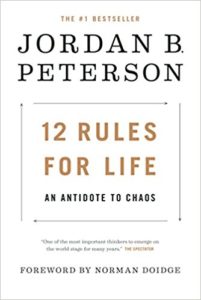
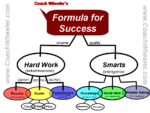
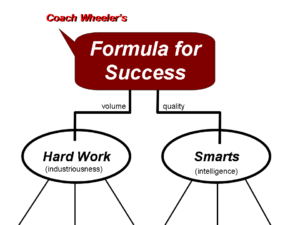 This probably won’t sound earth shattering but it should make immediate sense when you think about it. “The
This probably won’t sound earth shattering but it should make immediate sense when you think about it. “The  The Formula for Success has 3 parameters under “Hard Work”. They are (1) Passion, (2) Health and (3) Consciences. Let’s look at each in more depth.
The Formula for Success has 3 parameters under “Hard Work”. They are (1) Passion, (2) Health and (3) Consciences. Let’s look at each in more depth.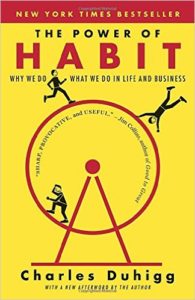
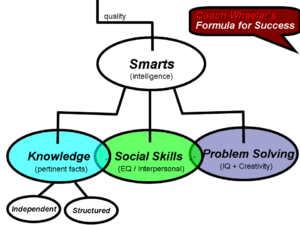 The second major component of Success is “Smarts” or “general intelligence”. Coach Wheeler breaks this down into 3 parts, (1) Knowledge, (2) Social Skills and (3) Problem Solving. Going back to Jordan B. Peterson, he has said that the studies show intelligence, as measured by IQ, is incredibly difficult to improve. On the other hand, Knowledge can continually be accumulated and you can gather facts or ideas that you can use across a wide variety of situations. Coach Wheeler also added Social Skills to his model for success and we will discuss how to build and leverage them more below.
The second major component of Success is “Smarts” or “general intelligence”. Coach Wheeler breaks this down into 3 parts, (1) Knowledge, (2) Social Skills and (3) Problem Solving. Going back to Jordan B. Peterson, he has said that the studies show intelligence, as measured by IQ, is incredibly difficult to improve. On the other hand, Knowledge can continually be accumulated and you can gather facts or ideas that you can use across a wide variety of situations. Coach Wheeler also added Social Skills to his model for success and we will discuss how to build and leverage them more below.
